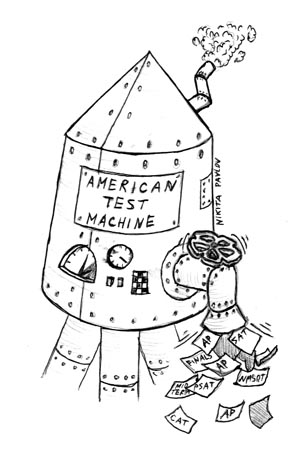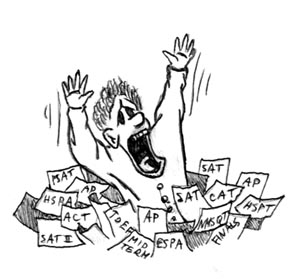Standardized Tests: Measuring the Wrong Qualities
Verisimilitudinous is to phantasmagoric as defenestrating is to... If the above analogy brought a chill of cold sweat upon your brow as the
painful memories resurfaced, then
you are probably among the overwhelming majority of students who, at some time
in their lives, have been subjected to the grueling torture of standardized tests.
Standardized tests are this nation’s method of seeing whether it is getting its money’s worth by subsidizing public schools. Administering such exams as the numerous grade level proficiency tests, the system can distribute several versions of the same test nationwide, efficiently run the scantrons through the apparatus, and print out computerized statistics for all to enjoy. The College Board attempts to be more sophisticated with the SATs by augmenting legions of multiple choice questions with written essays and fill-in-the-blank problems.
Most standardized tests are a poor measure of social intelligence, but rather
predict a narrow band of mental functioning such as achievement in school and on
other similar tests. Despite this
widely suspected fact, so many schools and colleges place emphasis on good
results that the students and parents have no choice but to go with the flow. With the SAT I and SAT II, there is increasing peer pressure
to invest an extra few hundred dollars into special tutors, evening classes, and
as many of the numerous Barron’s and Kaplan training books as humanly
possible. Very often, results of
the tests no longer reflect a student’s inherent knowledge and
resourcefulness, but how much cramming and preparation has taken place between
the registration date and the day of the exam.
Besides, do the SAT-type tests really attempt to measure the important qualities in students? SATs claim to measure reading comprehension through “real world” articles, and yet they filter out all race- or gender-specific concepts. It also makes very little sense to test the understanding of a page’s worth of words that can only be found in test prep books and that will be forgotten ten minutes after the test is over. Do you really plan to impress your siblings or future colleagues with phrases like “be sure to masticate your provender properly” or “better tighten the security; there’s a clandestine surreptitious insurrectionist skulking about”? Sure, it’s important to have more than a few dozen words in one’s vocabulary, and hardly anyone enjoys receiving a letter where the appositive is not set apart by commas, but taking it to the extremes often does more harm than good.
Let this come as no shock to all of us who like to grumble about the torment of tests, but the United States’ system of testing isn’t even the most rigorous or demanding. In good European tradition of old, exams would consist of oral poetry recitations and analysis of literature on the spot, perhaps a few mathematical proofs and derivations on the board, and several essays on the topic of, oh, thirty or forty required summer reading books. No curves, no multiple-choice and fill-in-the-blank questions, no synopses of what will be on the test a day before – all those things that American students like to take for granted to make life easier for them.
Even though more and more colleges like to stress that they don’t give the standardized test scores as much emphasis as other personal information, many students feel pressured to go out of their way to do well, even if that means buying whole libraries of prep books or practicing for the test on a weekly basis. Moreover, many schools get into the habit of administering vast amounts of achievement tests of their own. This year, our New Providence High School has put aside 39 days, or 22% of the school year, for various testing. Recently, an IQ achievement test was produced for four-year-olds seeking to be admitted to a competitive kindergarten!
There is a reason why American students get the chills when it comes to taking standardized tests. They attempt to measure the wrong things and are barely successful even at that. The rising necessity to get superior scores detracts from time that could be spent doing much more useful things (dare I suggest reading a book?) The American society as a whole must make an effort to get beyond this simplistic system of testing, no matter how efficient it may seem, and start stressing things that are important if it is to produce high-caliber individuals in today’s highly competitive and demanding world.